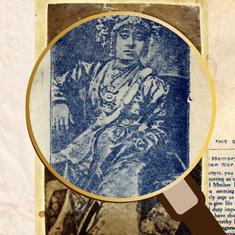Ek Gunah Aur Sahi (One Sin More) ran for 52 consecutive weeks in 1975 in Karachi’s cinema halls. The superhit is based on the controversial short story Mummy by Saadat Hasan Manto.
Sabiha Khanum, one of Pakistani cinema’s finest actresses, plays Mummy, the conflicted central character. Mummy is a doting mother, ambitious for her daughter’s future. She is also a madam, procuring and providing call girls, including her daughter Afsha (Rani), to well-heeled clients. Mummy is deeply religious, praying to St Joseph and Mother Mary regularly, but also bold and ruthless. When one of her girls is threatened with blackmail, Mummy is able to arrange a fix simply by visiting the Chief of Police.
One day, a client comes to Mummy and informs her that he needs a “modern girl who really knows how to dance” for a party he’s arranging with a powerful businessman. Mummy assures him that he and his friends will have the best, most modern girl for their party. “But she is very expensive.”
Mummy sends Afsha to the party. Afsha is clearly not comfortable with the arrangement. As she is singing and dancing before the group of leering men, the chief guest, played by the versatile Talish, begins to grope her. Afsha tries to reason with him but he spits out, “We rich are sharif. Your sort are sinners. You do what we say!”
Afsha counters with, “What you’re looking for is a tawaaif. I’m not that.” She runs out into the dark streets where she is hit by a passing car driven by Asif (Mohammad Ali). Asif rushes her to the hospital where he is taken by her beauty and her damaged soul. He proposes marriage. Mummy is overjoyed that at last she has managed to provide a good future and home for her daughter.
Spiced up with ample doses of masala – undying love that is soon abandoned, rape, death, ghosts of past lives, blackmail, star-crossed lovers, horrible accidents, money, sex, booze and God – the movie is an intense moral social drama. While in many instances it reinforces the stereotypes of Christians as immoral drunks and Christian women as little more than whores, director Hassan Tariq creates space for more subtle and compassionate interpretations. The recurring theme of upper-class exploitation of those it deems to be sinners and the dilemmas within which the non-elites are forced to live out their lives highlight the moral bankruptcy that lies at the heart of “sharif” society.
Sahiba’s performance as Mummy is outstanding. Not just through her lines – delivered in the perfect accent of a non-native English educated Urdu speaker – but in her repeated confrontations with Asif and other men far more powerful than herself, Mummy is revealed to be a woman of great strength, resilience and ultimately, morality. In the end, she proves the powerful Asif and his society to be the real sinners.
The film’s music was composed by Nisar Bazmi. Originally from Maharashtra, Bazmi had established himself as a composer of some note in Mumbai, writing songs sung for Lata Mangeshkar, Asha Bhosle and Mohammed Rafi, who sang perhaps Bazmi’s most beloved melody Chand Ka Dil Toot Gaya Hai in the film Khoj (1953).
On a visit to Pakistan in the early 1960s, Bazmi was asked to compose music for a few films, which he did. He ultimately opted to settle in Pakistan and went on to become one of the great music directors, composing for dozens of films in a wide range of styles from folk and classical to pop and rock.
Kya Haseen Jism Hai is the song sung by Afsha as she dances for the businessmen. Mehnaz delivers the mid-tempo number with huge pathos and sadness. This is the song of a woman who knows exactly what sort of world she is living in. Through Saifudin Saif’s unrelentingly depressing lyrics and Mehnaz’s moody singing, the audience is treated to a cold critique of a certain class of cashed-up Pakistanis who live lives far removed from most of the viewers.
The music is understated, which is not what one would expect from a vamp’s nightclub solo. Bazmi gets some excellent, soulful electric guitar licks out of his band of musicians and expertly increases the emotional tension by employing a small orchestra of strings. But overall, the music is composed in such a way as to give Mehnaz the space to do her moody interpretation of a very sad business.
A version of this story appeared on the blog https://dailylollyblog.wordpress.com/ and has been reproduced here with permission.










